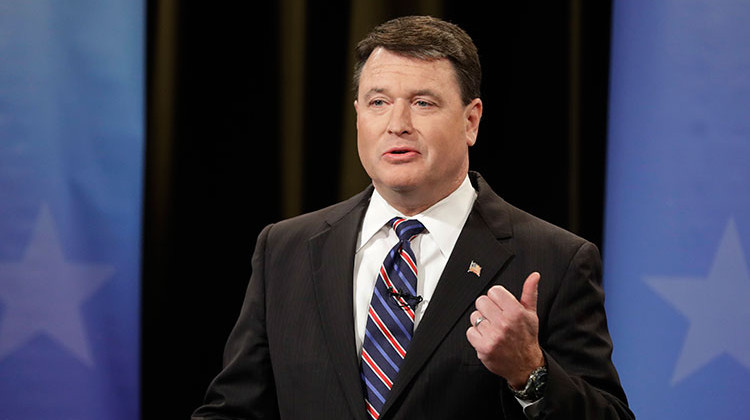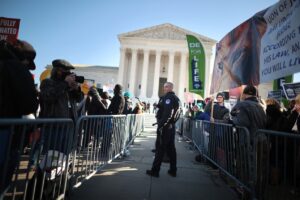Indiana Attorney General Todd Rokita testified before a U.S. Senate committee this week, telling senators that Senate 1, the mammoth election bill, would increase voter fraud and rob states of their right and duty under the U.S. Constitution to decide how elections should be run. And if it passes and becomes law, Indiana will sue.
“The 2020 election was unlike any other in our history and it doesn’t need to be repeated, because we shouldn’t be having pandemics every time we have a presidential election,” Rokita said in his testimony, delivered by zoom from Indiana to the Senate Rules Committee, chaired by Minnesota Sen. Amy Klobuchar, a Democrat.
“The 2020 elections involved an effort to convert what had been election day in our country to a months-long process of vote-gathering, ballot-harvesting, last-minute rule and law changes by people not authorized to do so,” said Rokita. “And all this resulted in shaken confidence in our electoral system and a profound unease if not outright distrust about the results.”
As Indiana’s secretary of state from 2002 to 2010, Rokita defended Indiana’s new voter ID law, then considered among the strictest in the country. The case went to the Supreme Court, where justices ruled the law did not violate a right to vote.
He subsequently served in Congress, representing Indiana’s Fourth Congressional District from 2011 to 2019 and in 2020, was elected as attorney general.
Rokita sent a letter to Congress in early March, signed by 19 other attorneys general, opposing H.R. 1 and S. 1 – the two companion bills in Congress that Rokita says would abolish voter ID laws in all 50 states and force states to allow no-excuse mail voting.
In his testimony on Wednesday, he spoke at length about the chaos of 2020 presidential election, in which Democrats filed more than 400 lawsuits to strike down state election laws, using COVID-19 to force mass mail voting.
“Americans saw mountains of ballots being processed in cavernous central-count processing centers, tens of millions of mail-in ballots overloading the process and capacity of the system in many states, turning the tabulation of votes into a weeks-long process,” Rokita said. “In case after case, we saw vote watchers and observers excluded from an opaque, seemingly never-ending counting process.”
“Many of the problems of 2020 resulted from the efforts of those without the authority to do so trying to control how the election was run and changing election rules at the last minute,” said Rokita. “This led to an unprecedented number of election lawsuits that have, frankly have overwhelmed the system.”
Dozens of election lawsuits were filed by the Trump campaign and other Republicans following the election, but in no case did any judge grant an evidentiary hearing and take testimony from witnesses. Most cases were dismissed.
Rokita said on Wednesday that S. 1, called the “For the People Act,” if it became law, would increase the number of lawsuits.
“The mandates of this bill are wholly unnecessary and the determinations for how elections are operated should remain with the states, as intended by the framers, for good reason,” he said.
He spoke directly to the issue of identification, defending Indiana’s Voter ID law, which requires a government-issued ID to vote.
“The proposed changes will open our elections up to increased voter fraud and irregularities and perhaps the most egregious provision is the act’s elimination of voter and photo ID laws,” Rokita said. “Requiring government-issued photo ID at the polls represents a common-sense, simple best practice for election administration and is in place in over 32 states.”
In addition to eliminating Voter ID laws and forcing states to allow anyone to vote who claims to live in the state, H.R. 1 and S. 1 would also require states to allow same-day voter registration and online registration and would restrict the ability of states to remove people from voter rolls. They would also establish public funding of congressional campaigns.
The bills, said Rokita, would take things in the opposite direction that a free society should be going in if it wants to protect the votes of Americans.
He told of recently meeting a Mexican woman who is a dual citizen of the United States and Mexico, and seeing her voting card that had both a photo and a thumbprint, saying she explained how when she goes to vote in Mexico, she has to dip her thumb in ink so that the print can be compared to the print on her voting card.
“Now this is Mexico, by many a third-world country, that has better turnout than we do, upholding the integrity of one-citizen, one-vote there and here, in this bill, making a lot lower standard than that illegally,” Rokita said.
“Regardless of which party or candidate a voter favors,” he added, “all Americans should have confidence in the outcomes of elections. No American’s vote should be devalued by fraudulent votes.”
Rokita ended by telling the members of the Senate Rules Committee that if S. 1 becomes law, Indiana will waste no time in filing a lawsuit.
“Should the act become law, I can tell you the sun won’t set in Indiana before we sue the federal government and I’m sure other states will join,” he said.
Jim Bopp of Terre Haute, one of the top Republican election lawyers in the country for more than four decades, said earlier this month that S. 1 is similar to the Alien and Sedition Act of the 1790s.
“It is so partisan. It is so designed to cement into power one political party as opposed to the other by, not just one change, or two changes or even a dozen changes, but dozens and dozens of changes in law, all of them designed to cement their hold on power.”
But he said if it’s passed and signed into law, it may be hard to stop, as a provision in the bill limits legal challenges.
H.R. 1 passed the U.S. House of Representatives on March 3 and all eyes are now on the U.S. Senate, where Democrats must find 60 votes in order to override a likely Republican filibuster.
This article was originally posted on AG testifies Indiana will sue to protect the votes of Americans if bill passes






Be First to Comment